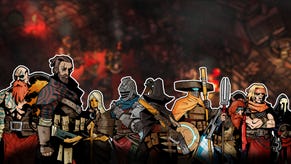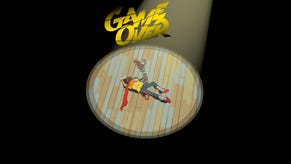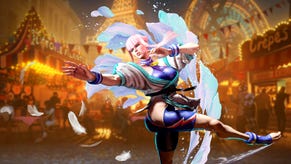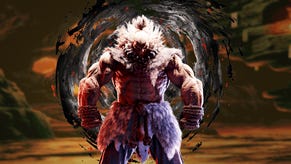The Time a Japanese Famicom Game Tried to Simulate American Presidential Politics
As the 2016 presidential election finally comes to a close, we look back on Japan's optimistic take on American electoral politics.
This article first appeared on USgamer, a partner publication of VG247. Some content, such as this article, has been migrated to VG247 for posterity after USgamer's closure - but it has not been edited or further vetted by the VG247 team.
Today is the final day of the 2016 presidential election; and as nightmarish as this season has been, presidential elections have never been more relevant to our national conversation. And yet, they have rarely been reflected in our games.

Looking back over the 20 or so years, the most significant election game has been The Political Machine—a lighthearted sim that has been released with each new election cycle since 2004. But while it has some fairly sophisticated concepts working under its hood, it's much more tempting to take it to the extremes and play for the ridiculous. One reviewer went so far as to create Robot Elvis, which should tell you everything you need to know about The Political Machine's sense of humor.
Beyond that, the day-to-day grind of politics is actually pretty boring, and elections moreso. As much as we like to obsess over the horse race, elections ultimately come down to knocking on doors, making phone calls, and wrangling voters. It's a far cry from the politics we're used to seeing in games, where elections tend to happen invisibly, and high stakes negotiations can end with you getting nuked by Gandhi.
But back in 1988, one Famicom game did make a good faith effort to grapple with American presidential politics. That game was America Daitoryou Senkyo—a sim that follows the 1988 election from start to finish. It brings with it an oddly optimistic outlook on the election, particularly compared to what we're used to now, focusing primarily on policy to the exclusion of the antics to which we've become accustomed. It also has a particularly Japanese outlook in the way that it zeroes in on issues that matter to Japan, such as trade and car import restrictions.
That outlook is reflected in its candidates, some of whom are familiar, some of whom are fictional. You have "Push" and "Dekakis"—candidates based on George Bush and Michael Dukakis respectively—but you also have "Sasha," a Margaret Thatcher-like figure from Michigan who strongly opposes Japanese trade, and "Suzuki," a Japanese-American conservative. Beyond the core candidates, you can also choose Zackson (Jesse Jackson) or Robert (Pat Robertson), neither of whom have any chance of winning owing to their low poll numbers at the outset. If that's not some biting political commentary, then I don't know what is.
Once you pick your candidate, you choose from a pool of potential aides, several of whom look like they belong in a Japanese shojou manga.

The bulk of the game focuses on the primaries, where you choose your position on issues ranging from the revival of Christian morality to the prohibition of commercial whaling. After choosing where you stand, you can order television commercials, conduct polls, and choose which states to focus on, which will in turn earn you delegates toward winning your party's nomination. It's a dramatically simplified version of what actually happens during a campaign—it doesn't reflect the differences between caucuses and primaries, for one thing—but it does manage to capture some of the push and pull of running an actual campaign.
Your positions will impact where you stand in each state, and if you shift to make one group happy, you will anger another. Some states matter more than others, of course, so if you're particularly craven, you can try and pick the range of policies that will most appeal to the big states. From time to time the game will also throw a wrench in the works by introducing a current event, say the terrorist bombing of an oil tanker, which will impact your standing on an issue. If you are seen as weak on defense, for instance, your polls will be impacted accordingly.
Ultimately, America Daitoryou Senkyo is a resource management sim with a political bent; and while it has some interesting wrinkles, it can't begin to capture the full scope of American politics, not the least because the actual election is limited to a single round at the end of the game. If you get the nomination, then the actual election is effectively a victory lap. Of course, we know that there's no such thing as a foregone conclusion in real life electoral politics—just ask Hillary Clinton.
But despite it limitations, it makes for an interesting period-specific curiosity. It reflects the international interest in American president politics, the results of which can have a broad impact on the world stage, and it hits on many of the issues of the day. For political junkies, it's a throwback to a simpler time—one before social media and the "War on Terror," and before 24-hour news cycles really began to take hold (though CNN was very much a thing by 1988).

In other respects, it feels almost quaint. One of the lasting legacies of this election is that there has been next to no discussion about actual policies outside of a handful of very broad topics. It has instead been a referendum on whether crass tweets or hacked emails or a million other problems should disqualify you from being president. Ask an actual voter what they think Donald Trump's position on defense or trade, and they might say, "Build the wall!" or "Ban all of the Muslims," but there's been little room for a nuanced discussion on, say, the ongoing impact of globalization on domestic jobs (vague pronouncements about NAFTA aside).
But even back in 1988, the trend toward electoral mudslinging was already starting to take hold. The 1988 election will always be remembered for its infamous Willie Horton ad, which used race-baiting tactics to paint Dukakis as being soft on crime. Imagine something like that in a Famicom game.
Mostly, though, politics have become raw and personal in a way that games struggle to seriously reflect. The Political Machine deflects that by rendering its candidates as amusing caricatures and trying to be silly and escapist. America Daitoryou Senkyo, meanwhile, tries hard to be faithful to its subject matter, but it ultimately presents its elections as a calm and rational debate over the issues. Neither gets to the heart of the raging emotions that define our elections these days. Then again, that's probably a lot to ask of a Famicom game.
And anyway, maybe we don't want an accurate reflection of our electoral politics. With so many people turning toward games as a form of escapism, it can be nice to play a sim that shows us as we perhaps ought to be rather than as we actually are. In that, at least, America Daitoryou Senkyo holds up.
Thanks to Hardcore Gaming 101 for the screens.









